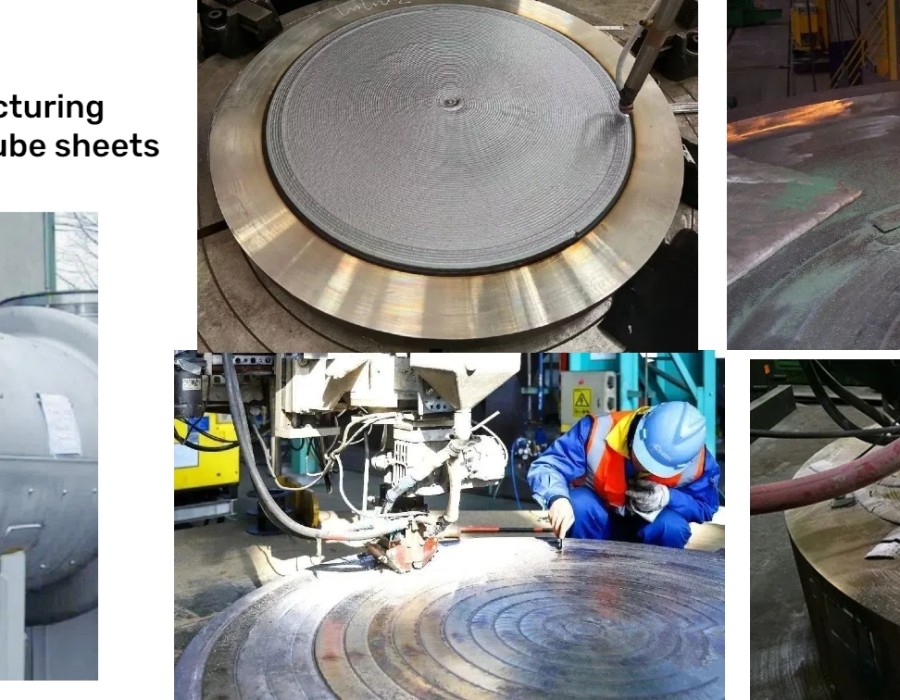What is the function of overlay welded tube sheets?
In industrial applications, corrosion resistance and structural integrity are very important, and welded overlay tube sheets have become essential components. Overlay welding also known as cladding, is a process of coating a corrosion-resistant alloy on the surface of a based materials. This technology provides an effective solution to protect the tube sheet from the impact of corrosive environments and extends its service life. And it can greatly reduce costs.
The main purpose of overlay welding tube sheets is to improve the performance and durability of heat exchangers, boilers, and other equipment using tube sheets. The following are some main advantages and precautions related to overlay welded tube sheets:
Corrosion Resistance:
By cladding a layer of corrosion-resistant alloy to the tube sheet's surface, the weld overlay layer protects against corrosion caused by corrosive fluids, high temperatures, or harsh operating conditions. This corrosion resistance helps to minimize maintenance requirements and maximizes the service life of the equipment. Common corrosion-resistant overlay metals include copper, titanium, nickel, cobalt based alloys, and austenitic stainless steel. For example, stainless steel overlay welding is used on the inner walls of petrochemical containers. When welding, workers should pay attention to the dilution rate of the based plate on the welding layer to ensure the alloy content required for corrosion resistance of the welding layer.
Material Compatibility:
Weld overlay tube sheets allow for the selection of different materials for the base material and the cladding layer. This flexibility enables the use of cost-effective base materials while ensuring optimal corrosion resistance and compatibility with the process fluids or gases. The chemical composition of the welding material should be similar as the base materials to ensure that the welding layer has good corrosion resistance and wear resistance. The welding material should have sufficient strength and toughness to ensure the structural performance and durability of the welding layer. The overlay welding material should have good welding performance, including melting point, fluidity, wettability, etc. The welding material should have good crack resistance to ensure that the welding layer will not crack due to vibration and deformation during operation. The welding material should have a certain degree of wear resistance to ensure that the welding layer does not excessively wear during operation.
Enhanced Strength and Integrity:
Weld overlay also improves the mechanical properties of forged tube sheet, including strength and toughness. It has higher hardness and wear resistance, and can withstand longer periods of wear and impact. The cladding layer adds an extra level of protection and reinforcement to the base material, reducing the risk of failure or leakage during operation.
Customization and Precision:
Weld overlay tube sheets can be tailored to specific project requirements, such as the size and pattern of the tube holes, the thickness and composition of the cladding layer, and the welding techniques used. This customization allows for precise fitting and dependable performance in various applications.
When selecting weld overlay tube sheets, several factors should be considered:
1.Corrosion Environment: Assess the nature of the operating environment, including the temperature, pressure, and the types of fluids or gases being processed. This information helps determine the appropriate corrosion-resistant alloy for the cladding layer.
2. Base Material Compatibility: Consider the compatibility between the base material and the cladding layer to ensure optimal bonding and long-term performance.
3. Cladding Thickness: Determine the appropriate thickness of the cladding layer based on the severity of the corrosion environment and the desired service life of the equipment.
4. Manufacturing Standards: Verify that the weld overlay tube sheets comply with relevant industry standards and quality assurance processes to ensure their reliability and performance.
In summary, weld overlay tube sheets play a crucial role in enhancing the corrosion resistance and durability of heat exchangers, boilers, and other equipment. The careful selection of materials, customization options, and adherence to manufacturing standards are key considerations when choosing weld overlay tube sheets for optimal performance and long-term reliability. https://www.wuxichangrun.com/






Comments